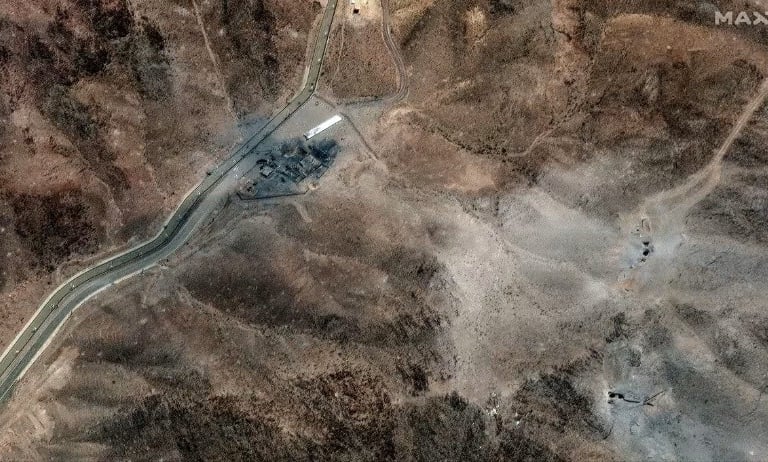Chagos Islands deal carries major implications for Iran-Israel tensions
A recent article published by Professor Richard Ekins, KC, and Marcus S. Hendriks in Policy Exchange has highlighted the potential consequences of the recent agreement between the United Kingdom and Mauritius over the future of the British Indian Ocean Territory for ongoing political tensions in the Middle East, with the deal potentially placing the UK in challenging legal waters.
NEWS FROM THE OVERSEAS TERRITORIESBRITISH INDIAN OCEAN TERRITORYOPINION
A recent article published by Professor Richard Ekins, KC, and Marcus S. Hendriks in Policy Exchange has highlighted the potential consequences of the recent agreement between the United Kingdom and Mauritius over the future of the British Indian Ocean Territory for ongoing political tensions in the Middle East, with the deal potentially placing the UK in challenging legal waters. Whilst the legality of strikes on nuclear sites within Iran by Israel has already been called into question by Lord Hermer, with the Attorney General arguing that the UK only ought to support Israel in a ‘defensive’ capacity to mitigate the risk of becoming entangled in an ‘illegal’ war, the relative proximity of the airbase on the island of Diego Garcia to the Persian Gulf, along with its vital importance as a base for US strategic bombers in the Indo-Pacific, has meant that the recent agreement has faced new scrutiny from legal experts.
As the report contends, the legal ramifications of the current conflict are already challenging enough for the UK whilst the archipelago remains a British Overseas Territory. Under the current arrangement, the United States requires permission from London to launch any offensive operations from the base, given the possibility of attempted retaliatory strikes on Diego Garcia. Whilst in the days following the publication of the report, the United States was able to carry out a strike on Iran’s Fordow enrichment plant using its B-2 stealth bombers without the use of Diego Garcia, in the event of any major escalation, use of its fleet of B-52 bombers, many of which operate from the BIOT, would likely prove an integral part of the nation’s strategy. Though Israel and the United States have both claimed that targeted strikes against Iran’s nuclear programme are effectively defensive in nature, Lord Hermer’s comments prior to the strikes criticising Israel’s action against Iran makes it difficult to determine the position of the British government over the legality of such attacks, even if more recent statements from ministers have seemingly contradicted Lord Hermer’s earlier remarks reported in the Telegraph. Nonetheless, if the US decided to use its B-52 bombers stationed on Diego Garcia, the UK could theoretically veto their use.


Aftermath of US strike on the Fordow facility using long-range B2 stealth bombers
However, whilst the UK may have a nominal veto over US strikes from the airbase whilst it remains a British Overseas Territory, there is a broad consensus among experts that the likelihood that this power would ever be exercised is minimal. Yet, if sovereignty of the archipelago is transferred to Mauritius under the terms of the current agreement, the chances legal complications are greatly exacerbated. As the report points out, Article 4 of the agreement states that ‘activities in relation to the Base… shall be in compliance with international law’, meaning that the UK is under a binding obligation to ensure that any military action carried out from the airbase is in accordance with international law, a stipulation that Mauritius is likely to monitor keenly. As a result, the British government can no longer exercise sole discretion over whether to approve strikes launched from the base; it must also secure Mauritius’s approval or risk legal action for breaching the terms of the agreement. Although the current government has widely praised the deal for securing the base for another hundred years while preserving the UK’s legal ‘soft power’ in supranational organisations, it may soon face a choice between maintaining the base’s operational viability and avoiding further costly negotiations and diplomatic tensions with Mauritius. Such concerns are compounded by the fact that the UK is under an obligation to ‘expeditiously inform’ Mauritius of operations conducted from the base, a nebulous but potentially dangerous condition that risks further undermining the strategic value of the airbase in any future conflicts in the region.
In short, the deal has placed the United Kingdom in an even more difficult position. While the government has consistently expressed a commitment to strictly adhering to international law, even in the case of non-binding recommendations—it must now balance this stance against the strategic and diplomatic ramifications of potentially vetoing the United States' use of Diego Garcia to fulfil such obligations to supranational courts.
